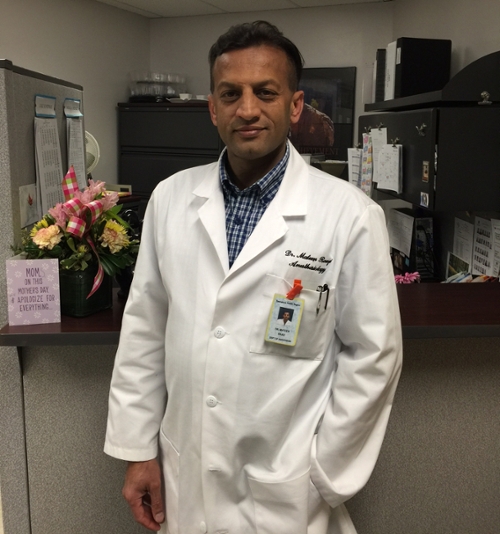
Students keep Dr. Raazi on his game
Anesthesiology professor wins Certificate of Merit from Canadian Association of Medical Education
By Marg SheridanWhile Dr. Mateen Raazi may no longer be the program director of the anesthesiology department, his influence on the program at the College of Medicine – and across Canada – is still being recognized.
Raazi, who is one of the 2016 winners of the Certificate of Merit from the Canadian Association of Medical Education, took the honour in stride – and with a laugh.
“Why did they choose to give it to me? I have no idea!”
And while he was happy to joke about it, there’s really no denying the fact that the award was warranted.
When Raazi joined the CoM full time in 2000 – having completed his MD in Pakistan before moving to the US to complete his residency and fellowships – the anesthesiology program was going through a pretty rough transition period that spanned a trio of Royal College accreditations.
“The first one was right at the time when the program wasn’t quite doing so well,” Raazi explained. “We had to overcome some hurdles, and then we successfully negotiated them so that our program is now being recognized as a model program across Canada.”
But while their more recent accreditation record is impressive, it’s the innovations in education that Raazi has helped to pioneer that earned him the CAME award. These innovations include the establishment of an adult learner based academic curriculum, transition to the use of electronic and remote communication tools for learning, and a formal program that specifically addresses health and wellness in residents.
“In the very initial stages of my directorship we pioneered the use of video conferencing to deliver the academic content for residents who were not able to attend in person,” he continued. “If they were away on their electives or rotations, they could join us via videoconference so that they were not missing out on the core program lectures and presentations.”
“And now it has become pretty much standard for all programs in Canada I would say.”
With the CAME award focusing heavily on teaching innovation and excellence, Raazi helped establish a Canada specific examination database at the Association of Canadian University Departments of Anesthesia (ACUDA) level, similar to the one used south of the border.
“It’s a US exam - Anesthesia Knowledge Test (AKT) - but they only had a US database for it,” Raazi explained. “The American system for residency training is a little different than the Canadian system, so comparing Canadian data to US data wasn’t always the easiest thing to do.
“So we thought in order to make meaningful comparisons we needed to make a Canadian database so we would know where residents were excelling or where the weak points were.”
The database is just one of the many education-centric innovations that Raazi has helped spearhead. This work has also earned him a PAIRS Teaching Excellence Award (2013) as well as the recently awarded honour of Program Director of the Year for 2015-16 by the CoM. Still, he says the most rewarding aspect of his work always comes back to providing the best education he can for his residents and students. And that, Raazi said, is because he decided very early in his career that a clinical practice alone wasn’t going to be able to keep him professionally satisfied in the long run.
“Having residents and medical students with me is a two-way street: I learn from them as much as I’m able to teach them,” he said. “They keep me mentally sharp, and interested in the literature, and I think the idea is a very real and practical one: having learners actually improves the patient care that I can provide.
“The need to stay on top of not just the information, but how it’s delivered, and the justification of the techniques that we use, it forces us – me especially – to provide the best care that I possibly can to my patients.”
The students, and especially the senior residents, Raazi joked, can be a handful because they often get into the very minute details of each topic, and that forces him to be on top of his game as a teacher.
“One of the most humbling realizations is the fact that you cannot rest on present and past achievements. There is always an improvement that suggests itself, learners often come up with ideas that are often innovative and always challenging.”
